Signs of RSV Everyone Should Know


“REVOLT Honors Black Rob With Livestreamed Celebration - PRNewswire” plus 3 more |
| REVOLT Honors Black Rob With Livestreamed Celebration - PRNewswire Posted: 29 Apr 2021 08:57 PM PDT LOS ANGELES, April 29, 2021 /PRNewswire/ -- Today, REVOLT, the leading Black-owned multimedia platform will livestream and broadcast a homegoing celebration in remembrance of Black Rob. The Hip-Hop community mourns the loss of the acclaimed New York rapper, who will be laid to rest today, April 30. Black Rob, born Robert Ross on June 8, 1968, sadly passed away at the Grady Memorial Hospital in Atlanta on April 17. A member of the Bad Boy Records family, Rob's music took the world by storm with his 2000 solo debut, Life Story, which earned him a platinum plaque among other accolades. Black Rob was known for his hit "Whoa!" as well as '90s classics on the remix to 112's "Come See Me," Total's "What About Us," Faith Evans' "Love Like This" and more. REVOLT invites fans and friends within the community to honor the late MC with a Homegoing Celebration on REVOLT multimedia network today (April 30). The memorial will be live-streamed on REVOLT's YouTube channel beginning at 9 a.m. EST (memorial and viewing) and television network at 11 a.m. EST funeral coverage.
PRESS CONTACT: Related Images SOURCE REVOLT  | ||||||||||||||||||
| Soil collection ceremony reminds Columbia of its history - Columbia Missourian Posted: 29 Apr 2021 06:30 PM PDT Music reminded visitors that, "It's a long time coming," as people gathered to remember a tragedy in Columbia's history. That lyric from "A Change is Gonna Come" by Sam Cooke and performed by local musicians Robert Wilson and Bill Thompson captured not just the event but also its history and emotions. A soil collection and plaque rededication ceremony took place Thursday at the site of the old Stewart Road Bridge, where James T. Scott, a Black man, was lynched by a mob of thousands of Missourians 98 years ago to the day. More than 100 people showed up Thursday afternoon to the James T. Scott Memorial Plaque by the MKT trail. 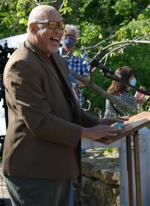 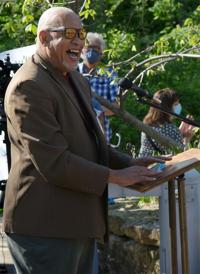 The Rev. C.W. Dawson speaks at the rededication for James T. Scott on Thursday at the MKT Trail in Columbia. Dawson spoke about the history of the lynching that occurred near what is now the MKT trial and addressed modern racial injustices. Haley Singleton/MissourianThe ceremony included members of city and county government: Mayor Brian Treece, County Commissioner Janet Thompson, Chief of Police Geoff Jones and City Manager John Glascock. Newly elected State Rep. David Tyson Smith, Boone County's first Black legislator, was also there. "This collection of soil is so important to remembering the last lynching in Little Dixie. This physical act of collecting this soil may be one of the last reminders that we have," Treece said. Physical markers, such as Scott's home, his street and the bridge he was killed on are all gone. In her speech, Thompson said that this would not be the last soil collection ceremony in Boone County. There will be another soil collection ceremony at the Boone County Government Center where a different lynching of a Black man named George Bush took place in 1889, she said. The three jars of soil filled and collected Thursday will be displayed at three different places. One in Columbia, another at the Black Archives of Mid-America in Kansas City and finally at the Legacy Museum in Montgomery, Alabama, which has been collecting soil from lynching sites across the South. 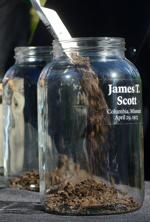 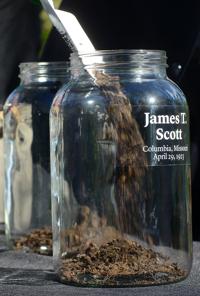 A soil collection ceremony and rededication of the James T. Scott memorial plaque is held Thursday on the MKT Trail in Columbia. Three jars of soil were collected; one to go to the Legacy Museum in Montgomery, Alabama; one to be displayed locally; and one jar to go to the Black Archives of Mid-America in Kansas City. Haley Singleton/MissourianScott, then a janitor at MU's medical school, was accused of rape when a 14-year-old girl, Regina Almstedt, followed a man to a set of train tracks and was violently assaulted, the Missourian reported. When she told her father and the police were called, Scott was picked out of a lineup as the man who committed the assault. One week later, a mob of more than 1,000 people led by City Councilperson George Barkwell walked into the Boone County Jail under the courthouse, broke Scott out and dragged him to the Stewart Road Bridge. Once they arrived at the bridge, the mob grew to over 2,000 strong, including members of the Missouri National Guard, who had been deployed to protect Scott. As Barkwell was tying a noose around Scott's neck and tying the other end of the rope to the side of the bridge, Hermann Almstedt, Regina's father, tried to convince the crowd that there was a chance Scott did not rape his daughter. Some in the crowd said that Almstedt should be lynched, too. Scott was killed around 1:40 a.m. April 29, 1923. The Rev. Clyde Ruffin, senior pastor of Second Missionary Baptist Church — where James Scott attended church with his family and got married — talked about Scott's life from childhood to death, and how his life was defined by the circumstances of his death. Ruffin told the crowd Scott's last words as he was thrown over the bridge: "I am innocent." "In retrospect, like many other lynching victims in America, James Scott appears to have been guilty only of asserting his manhood at a time when the acceptable roles for Black males were restricted to those of 'boy' and 'uncle,'" Ruffin said. "As a decorated war veteran, a wage earner, owner of a car and a dedicated husband and father, Scott challenged white conceptions of acceptable behavior." Local pastor C.W. Dawson told the crowd that "we remember, but what do we learn?" "What we call ourselves, what we call one another has a powerful effect," he said. "In 1619, we were called sub-human. We were called less-than." 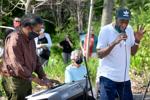 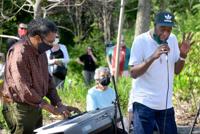 Bill Thompson, left, and Robert Wilson perform "A Change is Gonna Come" on Thursday at the soil collection ceremony on the MKT Trail. Following their performance was a moment of silence held in honor of the 98th anniversary of James Scott's death. Haley Singleton/MissourianAs members of the public were using trowels to put soil from pre-prepared buckets into jars labeled with Scott's name, "Columbia, MO" and the date of his death, people had hope that this would not only spark conversations but also continue conversations that had already started. "This is our opportunity for people to participate in history by being able to be in this soil collection, to be in this space. ... It also says that we can be innovative in how we have these conversations," said Brittani Fults, who read the text on the existing James T. Scott Marker. "(I hope) that we continue to have events like this, that people are willing to see that there has been a lot of injustice and we can come together as a people," said attendee Lois Connor. | ||||||||||||||||||
| Posted: 30 Apr 2021 02:54 AM PDT 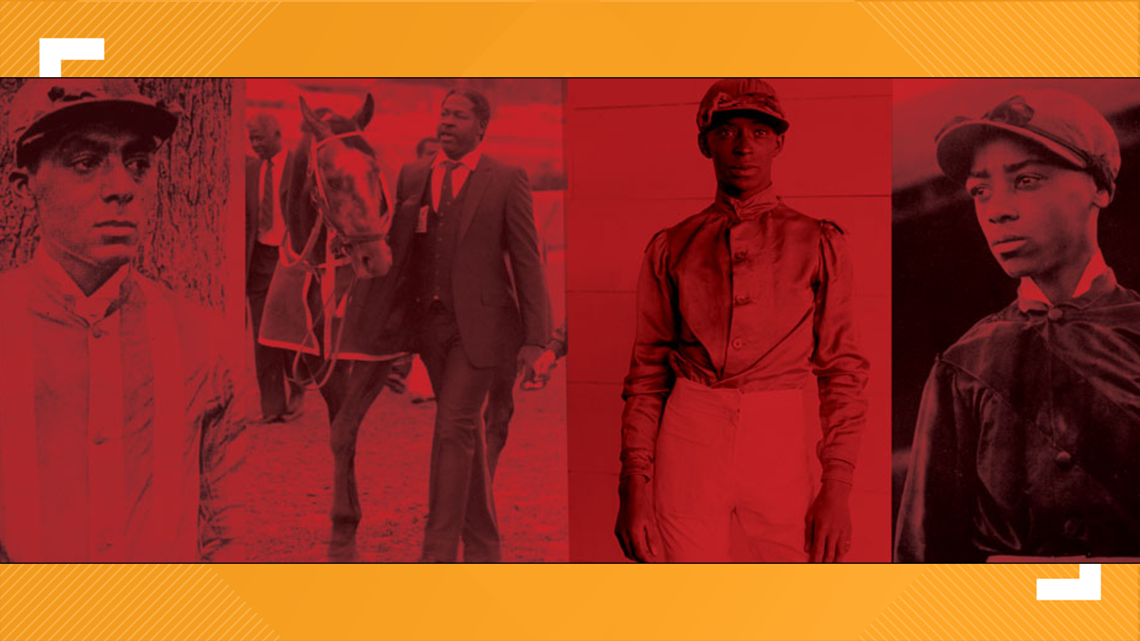 It's a history nearly forgotten. African Americans helped shape the thoroughbred racing industry. During the first Kentucky Derby, 13 out of 15 jockeys were Black. JACKSONVILLE, Fla. — It's known as the greatest two minutes in sports and as the Kentucky Derby gets underway this weekend, First Coast News is taking a look at the contributions of African Americans to the thoroughbred racing industry. It's a history nearly forgotten. On the Kentucky Derby official website, there is a tab under the history section dedicated to the legacy of black jockeys. These men played an essential role in shaping the sport early on. "When I started doing this that tab that's on the official Kentucky Derby website, it wasn't there then," said Dr. Derick McElveen Jr. "But it's there now." In 2015 McElveen, a Jacksonville native and founder of Talented Tenth Enterprises hosted his first derby party in the River City. It brought out young professionals in the area. The gathering was postponed by the pandemic in 2020 but it's set to happen for a sixth year on May 1. McElveen says it's to honor a legacy that needs to be acknowledged. While researching the Derby's history, he too was surprised to learn of the vital contributions of African Americans to the sport. "I immediately found the origin stories of how the derby came to be and the first participants and it just blew my mind," McElveen said. "And of course they were black men." In 1875, during the first Kentucky Derby, 13 out of the 15 jockeys were black. And among the first 28 derby winners, 15 were African-American. On the opening day of the Kentucky Derby, May 17, 1875, Oliver Lewis, a 19-year-old black native Kentuckian, rode to a record-setting victory. In the late 1800 black jockeys excelled. Jimmy Winkfield would be the last African American to win the world-famous race in 1901 and 1902. But by 1921 black jockeys disappeared from the Kentucky track due to racism and Jim Crow laws. They didn't return to the sport until Marlon St. Julien rode in the year 2000. The 11 Black jockeys who rode a total of 15 Derby winners between 1875 and 1902 were honored in 1980 by the NAACP and the Lincoln Foundation. There is now a plaque commemorating the occasion in the Kentucky Derby Museum's collection. RELATED VIDEO: | ||||||||||||||||||
| Posted: 30 Apr 2021 03:03 PM PDT It was a solemn honor for Mayor Brian Treece on Thursday to address a crowd gathered near the James Scott memorial plaque. Treece joined Boone County Northern Commissioner Janet Thompson, members of the Community Remembrance Project of Boone County and other local leaders to remember and educate people about the last documented lynching in the county. April 29 marked the 98th anniversary of the murder of James T. Scott, a Black man and University of Missouri employee who was lynched at the Stewart Road Bridge in the twilight hours of a spring day in 1923. The Community Remembrance Project hosted a soil collection ceremony Thursday afternoon, and soil from the site of Scott's killing will be displayed in the Legacy Museum in Montgomery, Alabama, and the Black Archives of Mid-America in Kansas City. The sand will also be displayed at the Boone County Government Center as a symbol of the community's commitment to working for a society that embodies justice for all, Thompson said.  "This collection of soil is so important to remembering the last lynching in Little Dixie," Treece said. "This physical act of collecting this soil may be one of the last reminders that we have." Treece began to detail how the physical markers that bore silent witness to the lynching are no longer standing. The Stewart Road Bridge is gone; instead, Scott's marker rests near an entrance to Columbia's MKT Trail. Also gone are the Scott family home and the Boone County Jail at Eighth and Walnut streets where a mob of 1,000 people — aided by a city council member — dragged Scott to his death, Treece added. More: NASA meets CASA: Hickman High School seniors present plan for zero-gravity plant lab Sharing James T. Scott's story more important than everThe Community Remembrance Project was born out of the idea that true reconciliation is a result rather than a strategy, said Brad Boyd-Kennedy, a member of the project. Keeping this history alive was at the heart of the project's purpose, he said. "It really is possible only after all people truthfully face their history and acknowledge their involvement in what has become known as white supremacy," Boyd-Kennedy said. Safeguarding this memory is more important than ever because it's the path to educating generations to come, Treece said. "These discussions around the events of our past are an important step toward moving forward," City Manager John Glascock said in a statement. "Having constructive and open conversations around the history of racism in Columbia will help us confront the challenges we face today." Scott was jailed due to an allegation of assaulting a 14-year-old white girl in Boone County. There wasn't an investigation into the alleged crime, and race played a key role in the presumption of guilt for Black men.  The mob that led to Scott's murder was comprised of members of the Missouri National Guard and students at MU. He was lynched at 1:40 a.m. on Sunday, April 29. More: Missouri COVID-19 cases top 500,000; more than 8,700 deaths "It's important for us to keep that before us all the time," said Nick Foster, a member of the project. "Remember him as a person. It's an awful story, but it needs to be repeated what happened that day." Scott challenged white conceptions of acceptable behaviorRev. Clyde Ruffin, senior pastor of the Second Missionary Baptist Church, said there is no greater tragedy than for a man's life to be defined by the circumstances of his death. Scott was a veteran of the Illinois National Guard and brought his two children to Columbia in 1919. He worked as a janitor at the MU medical school and married Gertrude Carter, a teacher at Frederick Douglass School. The two were married at Second Missionary Baptist — the same church where Scott's parents were married, Ruffin said. Scott was a car owner, and it didn't take long for he and his family to become prominent figures in the community, Ruffin added. More: Journalist killed in Kansas City was Springfield native, University of Missouri graduate "As a decorated war veteran, a wage earner, owner of a car, and a dedicated husband and father, Scott challenged white conceptions of acceptable behavior," Ruffin said. "His prominence in the community served as a visible symbol of strength, courage and achievement. And thus, the social impact of his murder was intended to destroy his story and the aspirations of all the generations that would follow. "But our presence here today proves that it has not." |
| You are subscribed to email updates from "black plaque" - Google News. To stop receiving these emails, you may unsubscribe now. | Email delivery powered by Google |
| Google, 1600 Amphitheatre Parkway, Mountain View, CA 94043, United States | |
Comments
Post a Comment